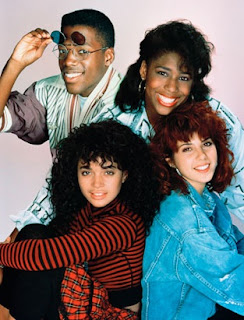 During the "British invasion" of the 1970s, I got a taste of British science fiction on PBS: Doctor Who, The Tripods, Timeslip, The Hitchhiker's Guide to the Galaxy, Space: 1999, UFO, and The Prisoner. One of my favorites was The Tomorrow People (1973-79), about children who are different. Like the X-Men in comics, they are the next stage of human evolution, with telekinetic, teleportation, and telepathic powers (which allows them to communicate with aliens from all over the galaxy). They work out of the Lab, in an abandoned London underground station, where they hide from the baddies who want to hurt them, fight various threats, and keep a watch for other Tomorrow People who are "breaking out" (recognizing their identity).
During the "British invasion" of the 1970s, I got a taste of British science fiction on PBS: Doctor Who, The Tripods, Timeslip, The Hitchhiker's Guide to the Galaxy, Space: 1999, UFO, and The Prisoner. One of my favorites was The Tomorrow People (1973-79), about children who are different. Like the X-Men in comics, they are the next stage of human evolution, with telekinetic, teleportation, and telepathic powers (which allows them to communicate with aliens from all over the galaxy). They work out of the Lab, in an abandoned London underground station, where they hide from the baddies who want to hurt them, fight various threats, and keep a watch for other Tomorrow People who are "breaking out" (recognizing their identity).The gay symbolism is obvious: children realize that they are different, but must keep their identity a secret.
During Season One (1973-74), the three main Tomorrow People were Kenny (15-year old Stephen Salmon), John (24-year old Nicholas Young, left), and Carol (Sammie Winmill). But then Stephen (16-year old Peter Vaughan-Clarke, right) "broke out" and quickly became the central character. He established a strong bond with John.
Stephen and John remained paired through Season Four (1975-76), as other Tomorrow People came and went with the frequency of Doctor Who's mortal companions.
There were also lots of other kinds of "different" kids. Robert (Jason Kemp), for instance, belonged to the alien Denagelee race, who hatch from eggs, releasing enormous energy (last time they hatched, the Roman Empire fell).
Mike frequently expressed heterosexual interest, but his constant shirtless, swimsuit, and underwear shots made up for it. He remained the central character until the series ended in 1979. (It was revived with new casts in 1992-95 and 2001-2007).
Mike Holoway is still a recording artist, and his numerous musical stage roles, such as Joseph and the Amazing Technicolor Dreamcoat and Godspell, provide substantial beefcake.
The American version (1992-1995) starred Christian Tessier.


















